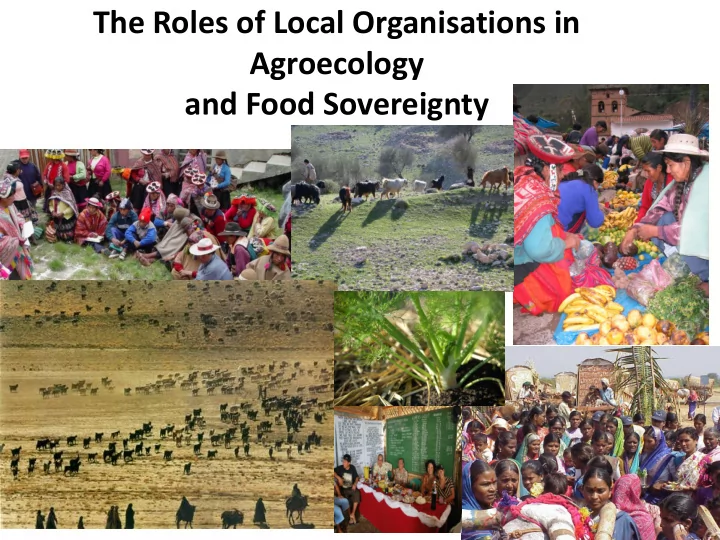

The Roles of Local Organisations in Agroecology and Food Sovereignty
Food, Agriculture, Environments and Livelihoods
Local organisations and collective structures The Medicinal Plant The Video The Native Potatoes Collective Collective Collective
Local adaptive management of food-producing environments • The use of Spring sophisticated environmental Winter Summer indicators to track Fall and respond to change
Local adaptive management of food-producing environments • The use of diversity to reduce risks and mitigate impacts of natural disasters and long-term environmental change
Nested local organisations and networks
Local organisations and people’s access to land and food • Locally-developed rules for resource access and use • Local organisations and access to land • Local organisations regulating access to food
Local organisations and economic exchange • Emphasis on market based solutions to meet food and other human needs - no or little thinking outside this box • Focus on money based markets overlooks importance of more plural forms of economic exchange (subsistence based markets, barter, solidarity economy…) • Local organisations mediate economic exchanges
Federations, networks and organised policy influence
Multi-scale networks of nested local organisations Local and regional coalitions e.g. AFSA Producer alliances – e.g. WAMIP) Federations of indigenous peoples La Via Campesina
Shared values and visions • Self-determination and endogenous development – many worlds possible and desirable • Rights based approaches e.g. UN Declaration on Rights of Indigenous Peoples • Emphasis on alternative policy framework for food and agriculture – “Food Sovereignty”
Federations of local organisations are well placed to promote countervailing power and more democracy. They can: • create safe spaces and participatory processes in which expert knowledge is put under public scrutiny through appropriate methods for deliberation and inclusion (e.g. citizens’ juries) • strengthen the voices of the excluded in setting agendas and framing policies and regulatory frameworks for development and environment — at local, national and global levels • Case study: Prajateerpu in South India
Democratizing the Governance of Food Systems - putting peasants and other citizens at the centre of governance • Six pathways for empowering citizens in policy-making & institutional choices: • 1. Learning from history to re-invent active forms of citizenship • e .g. Spanish civil war and peasant’s reclaiming control over land and other resources - http://www.diversefoodsystems.org/tfs/tfs5_anarchi sm.mov
• 2. Strengthening civil society - Collaboration between local and external civil society actors - Building upon synergies between the government and society - Independent pathways from below • 3. Methodologies for citizen participation in policy and institutional choices, including risk assessments
• 4. Towards greater information democracy - Autonomous media - Web based knowledge networks and multimedia
5. Nurturing citizenship Politics are too important to be left to professionals: they must become the domain of amateurs — of ordinary citizens. - With training and experience citizens can learn to deliberate, make decisions, and implement their choices responsibly - These skills do not arise spontaneously; they have to be consciously nurtured and are the result of careful political education, which includes character formation, personal and social training, and civic schooling — to produce citizens with the competence to act in the public interest.
6. Strengthening local organisations to expand agroecology, food sovereignty and democracy • Local adaptive management of environment • People’s access to land and food • Federations, networks and organized policy influence
• facilitate the horizontal interlinking and federating of citizen spaces as a way of decentralising and democratising the governance of food systems • support the emergence of large scale coalitions for change committed to agroecology, food sovereignty and well being (‘ buen vivir ’)
Two big challenges for local organisations
Social inclusion in local organisations Consciously developing forms of governance and relations that are: i) genuinely inclusive of gender and difference ii) democratic, with effective safeguards against the abuse, and concentration of power
Horizontal forms of organized cooperation – why and how? • Collective action and local adaptive management of ecosystems and natural resources over a wide area • Organized cooperation for economic exchanges among interdependent communities • Forms of governance: State-centric? Democratic confederalism? Or?
Recommend
More recommend